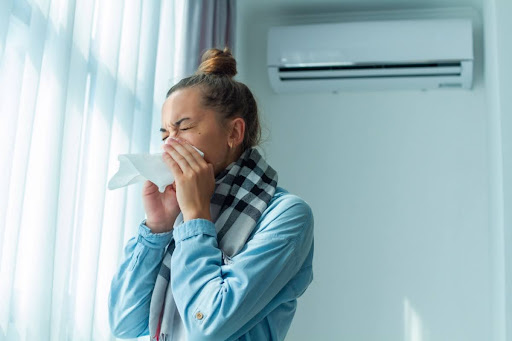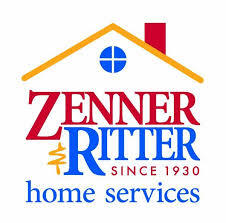Can Your HVAC System Cause Allergies to Flare Up?

Allergies have a sneaky way of catching us off guard. One day, you’re enjoying the fresh air, and the next, you’re battling a runny nose, itchy eyes, and relentless sneezing. It’s frustrating, especially when you’re trying to relax in the comfort of your own home. You might not suspect it, but your HVAC system could be playing a role in these unexpected allergy flare-ups.
Let’s dive into how HVAC systems impact allergies and what you can do about it.
How HVAC Systems Play a Role in Allergy Flare-Ups
Your heating and cooling system is supposed to make your home comfortable — but it also moves air throughout your house. If that air is carrying things like dust, pollen, or mold spores, it can spell trouble for anyone with allergies. This is the crux of the connection between HVAC and allergies, and why paying attention to your system’s health matters more than you might think.
Common Allergy Triggers Inside Your HVAC System
Every home has allergens floating around, and your HVAC system can easily become a collection and distribution center for many of them.
Some common culprits include:
- Dust: It doesn’t take long for dust to build up in vents and on filters.
- Pet Dander: Even if you vacuum often, dander from animal fur can get sucked into your system and recirculated.
- Pollen: It sneaks in through windows, doors, and clothing — and then ends up in the ducts.
- Mold Spores: High humidity levels and moisture in your HVAC components can lead to mold growth, especially in the duct system.
All this adds up to a potential spike in allergy symptoms like coughing, sneezing, itchy eyes, and stuffy noses.
Signs That Your HVAC System Could Be Making Allergies Worse
Understanding that your HVAC system can cause allergies to flare up is important, but identifying whether it’s affecting you is equally vital. Are you unsure if your HVAC setup is behind your allergies? Here are a few signs to watch for:
- Musty or dusty smells when your system turns on.
- More air pollution indoors than usual (visible dust in sunlight is a clue).
- Increased presence of bacteria, mites, or other tiny microorganisms.
Sound familiar? Then, it’s worth taking a closer look at your system.
What’s Hiding Inside Your System?
HVAC systems are more complex than they seem. Behind the vents and thermostats, there are several hidden spots where allergens like to hang out. Here’s what you might be dealing with:
Dirty or Worn-Out Air Filters
Your air filter is the first barrier between your lungs and the world of dust, particulates, and allergens. But over time, that filter gets clogged. A clogged filter doesn’t only limit airflow; it also becomes less effective at trapping new particles. This is one major way your HVAC system can cause allergies to flare up.
A high-quality HEPA filter or a filter with a decent minimum efficiency reporting value (MERV) can make a big difference here.
Mold and Mildew Buildup
If your HVAC system isn’t draining properly or if there’s too much indoor humidity, you might be creating a breeding ground for mold. Mold can grow in hidden spots like drain pans and ducts, releasing tiny spores into the air.
Mold exposure often leads to strong allergic reactions — and for people with asthma, it can be downright dangerous. A dehumidifier can help reduce the risk, but sometimes mold needs to be professionally cleaned out of the system.
Dirty Air Ducts
Over time, air ducts can collect debris, dust, dander, and even insects. All of this gunk gets blown right into your living space every time the heat or air conditioning kicks on.
Want cleaner air? Scheduling an air duct cleaning in Buffalo, NY, with Zenner & Ritter can help reduce indoor allergens and improve air quality.
The Real Connection Between HVAC and Allergies
So what’s the takeaway? The real connection between HVAC and allergies is pretty simple: a dirty or poorly maintained system can be a major source of allergy triggers inside your home.
HVAC and the Indoor Environment
Temperature and humidity matter, too. If your system is cooling your house too much or drying out the air, it could irritate your nose, throat, and eyes — making things worse. On the flip side, too much moisture in the air encourages mold and mildew growth, both of which are common allergy offenders.
Using tools like a smart thermostat can help manage temperature and humidity more effectively, keeping things in that “just right” zone for your immune system.
What You Can Do to Allergy-Proof Your HVAC System
So now that we know how HVAC systems impact allergies, let’s talk about what you can do to cut down on allergens and breathe easier at home.
Regular HVAC Maintenance
Keeping your system in good shape is one of the best things you can do for your family’s health. That includes:
- Changing filters at least once a year, more often if necessary..
- Having your system inspected seasonally.
- Cleaning the evaporator coils and drip pans.
- Checking for leaks.
- Looking out for signs of contamination and clogged ducts.
If you need maintenance for your air conditioner in Buffalo, Zenner & Ritter has you covered with our professional services.
Cleaning and Vacuuming Regularly
Use a vacuum cleaner to remove allergens from carpets, upholstery, and furniture. Wash your pillowcases and mattress covers weekly in hot water to remove mites and allergens. Don’t forget the curtains and other soft surfaces too.
Consider Air Purifiers and UV Solutions
Air purifiers can be a great add-on, especially if someone in your house has asthma or severe allergies. Some systems even include ultraviolet lights to kill off bacteria and other pollutants that might otherwise go undetected.
Let Zenner & Ritter Help You Breathe Easier!
It’s frustrating when home — your safe space — becomes the source of constant sneezing, itching, or worse. But once you understand how HVAC systems impact allergies, you’re in a better position to do something about it.
At Zenner & Ritter, we’ve been helping Western New York families improve their comfort and indoor air quality for decades. We’re proud to be part of this community and to offer services you can trust. Our NATE-certified technicians can help clean up your system, improve airflow, and even recommend upgrades that suit your home’s unique needs.
Now that you know how HVAC systems impact allergies, why wait? Schedule a service with us today in Buffalo, NY, or one of the nearby areas. We’ll get your system running right and your air feeling fresh again!
